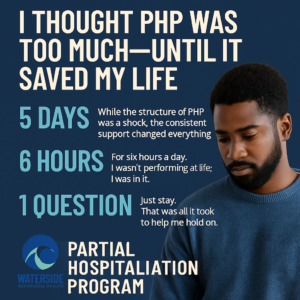I wasn’t new to mental health treatment when someone first brought up PHP. In fact, I was tired of the whole system. Therapists who didn’t call back. Meds that took the edge off but left me feeling like a blurry version of myself. I’d even tried a couple of outpatient programs—“less intensive” ones—where I mostly watched the clock and tried not to sound too broken in group.
So when someone floated the words “partial hospitalization program near me,” my gut reaction was, “Absolutely not.” It sounded like too much. Too clinical. Too serious. Too far from the version of myself I was trying to pretend still existed.
But that version of me was barely holding on.
I Looked Functional. I Was Falling Apart.
I didn’t scream for help. I didn’t have some dramatic crash. I looked okay. I answered texts. I kept up with work, kind of. I got really good at smiling with my mouth and not my eyes.
But the truth? I couldn’t get out of bed before noon most days. I skipped meals like it was nothing. I had this quiet, constant question in my head: “How long do I have to keep pretending?”
I wasn’t suicidal, but I wasn’t really living either. Just passing time. And therapy—the kind that meets once a week for 50 minutes—felt like tossing a glass of water on a burning building.
I didn’t need a pep talk. I needed real help. But I didn’t believe it existed.
What I Expected vs. What I Found
I walked into Waterside Behavioral Health in Plymouth, MA because I didn’t know what else to do. And even then, I was braced for disappointment. I imagined white walls, too many rules, and a therapist who would say “How does that make you feel?” until I walked out.
What I found instead was… weirdly human. There were real people in the room. Not perfect people. Not fake-smiling “inspirational” people. People like me. Some scared. Some mad. Some dead quiet. All of us there because something in our life wasn’t working.
The structure of PHP was a shock—but a good one. It was five days a week, almost full days, but somehow, that consistency made it easier, not harder. I didn’t have to rev myself up for each session like it was a performance. I could just… show up.
That alone changed everything.
The Power of Being Allowed to Stay
There was a moment, maybe my third week in, when I hit a wall. I didn’t want to talk. Didn’t want to try. I told myself I was going to leave. I didn’t belong here. I wasn’t sick enough. I was wasting everyone’s time.
A staff member caught me outside and said, “You don’t have to fix anything today. You just have to stay.”
Not try harder. Not dig deeper. Just stay.
That might have been the first time in my life I felt seen by a provider—not for what I produced or how well I performed recovery, but for simply still being there.
PHP Gave Me Tools—Not Just Talk
One of the things I resented most about my earlier treatment experiences was how abstract everything felt. “Use coping skills.” “Manage your emotions.” “Work on your trauma.” Okay, cool—but how?
In PHP, we didn’t just talk about skills. We practiced them. Daily. I learned how to recognize my early warning signs, how to interrupt a thought spiral, how to sit with discomfort instead of sprinting away from it. It wasn’t always pretty. I cried a lot. I snapped once. I almost quit twice.

But I didn’t.
Because the structure held me. Because someone always noticed when I pulled away. And because little by little, I started noticing things too: when I felt safe, when I didn’t, what I needed instead of what I thought I should need.
PHP didn’t erase my pain. But it gave me a damn good toolbox for when it came back.
For the Skeptics: You’re Not Wrong to Hesitate
If you’re reading this and rolling your eyes, I get it. Truly. You’ve probably tried things that didn’t help. You’ve probably had your story flattened or ignored. You might think a partial hospitalization program near you sounds like overkill. Or like a last resort.
But here’s what I’ll say: for me, it was the first thing that actually worked.
Not because it was shiny or magical. But because it met me where I was—in the middle. Not crisis. Not stability. Just… the messy, in-between part.
And sometimes, that’s the place where healing quietly starts.
Ready to Take the Next Step?
📞 If nothing else has worked—and you’re wondering what’s left—call Waterside Behavioral Health at (774) 619-7750.
You don’t have to commit to anything. But you deserve to know your options.
Explore their partial hospitalization program in Massachusetts to learn more.
FAQ: Partial Hospitalization Programs (PHP)
What is a partial hospitalization program (PHP)?
A PHP is a structured mental health treatment program that offers intensive support during the day—usually five days a week—while allowing you to return home each night. It’s more immersive than traditional outpatient therapy but less restrictive than inpatient care.
Who is PHP best for?
PHP is ideal for people who need more support than weekly therapy provides but who don’t require 24/7 inpatient care. It’s especially helpful during times of transition, relapse, crisis recovery, or when outpatient care just isn’t enough.
What should I expect in a PHP at Waterside Behavioral Health?
At Waterside in Plymouth, MA, PHP includes daily group therapy, individual sessions, medication management (if needed), and practical life skills support. It’s designed to feel intensive but human—not institutional.
Do I have to be in crisis to attend PHP?
No. PHP is for people in a range of emotional states—crisis, burnout, depression, anxiety, or simply feeling stuck. You don’t have to hit a breaking point to get help.
How do I find a partial hospitalization program near me?
If you’re in or near Plymouth, MA, reach out to Waterside Behavioral Health. Their PHP is trusted, compassionate, and grounded in real support. Call (774) 619-7750 or visit their PHP page to learn more.




